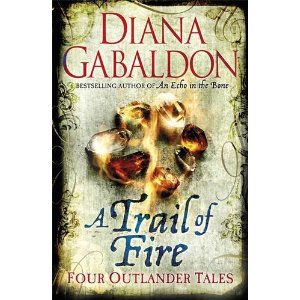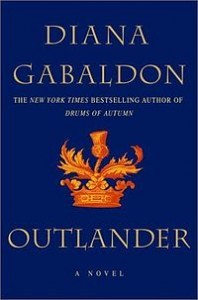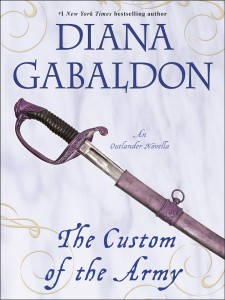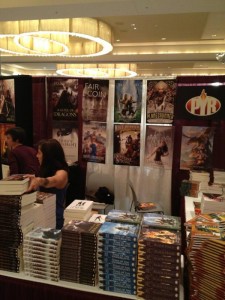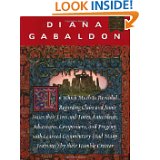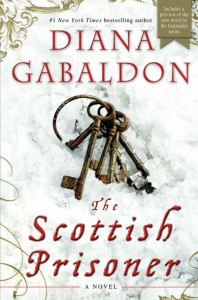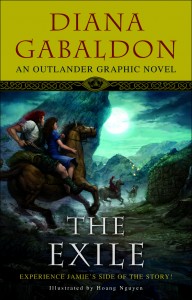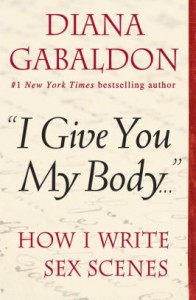
Happy Second Sunday of Advent! This particular excerpt is one that some of you may recognize; it was published as an “extra” in THE SCOTTISH PRISONER. I wanted to use it here, though, because of the spiritual theme of reconciliation and forgiveness, which seemed very appropriate to the season. (Last Sunday, we had an excerpt dealing with mourning and contemplation. Next Sunday is Gaudete Sunday—“Rejoicing” Sunday [g]—and we’ll have an excerpt dealing with joyful anticipation.) A Blessed Christmas (or Chanukah/Winter Solstice/Kwanzaa, etc.) season to all of you, and I hope you enjoy this.
William had left the house like a thunderclap, and the place looked as though it had been struck by lightning. I certainly felt like the survivor of a massive electrical storm; hairs and nerve endings all standing up straight on end, waving in agitation.
Jenny Murray had entered the house on the heels of William’s departure, and while the sight of her was a lesser shock than any of the others so far, it still left me speechless. I goggled at my erstwhile sister-in-law—though come to think, she still was my sister-in-law…because Jamie was alive. _ Alive_.
He’d been in my arms not ten minutes before, and the memory of his touch flickered through me like lightning in a bottle. I was dimly aware that I was smiling like a loon, despite massive destruction, horrific scenes, William’s distress—if you could call an explosion like that “distress”—Jamie’s danger, and a faint wonder as to what either Jenny or Mrs. Figg, Lord John’s cook and housekeeper, might be about to say.
Mrs. Figg was smoothly spherical, gleamingly black, and inclined to glide silently up behind one like a menacing ball-bearing.
“What’s this?” she barked, manifesting herself suddenly behind Jenny.
“Holy Mother of God!” Jenny whirled, eyes round and hand pressed to her chest. “Who in God’s name are you?”
“This is Mrs. Figg,” I said, feeling a surreal urge to laugh, despite–or maybe because of–recent events. “Lord John Grey’s cook. And Mrs. Figg, this is Mrs. Murray. My, um…my…”
“Your good-sister,” Jenny said firmly. She raised one black eyebrow. “If ye’ll have me, still?” Her look was straight and open, and the urge to laugh changed abruptly into an equally strong urge to burst into tears. Of all the unlikely sources of succor I could have imagined… I took a deep breath and put out my hand.
“I’ll have you.” We hadn’t parted on good terms in Scotland, but I had loved her very much, once, and wasn’t about to pass up any opportunity to mend things.
Her small firm fingers wove through mine, squeezed hard, and as simply as that, it was done. No need for apologies or spoken forgiveness. She’d never had to wear the mask that Jamie did. What she thought and felt was there in her eyes, those slanted blue cat-eyes she shared with her brother. She knew the truth now, of what I was—and knew I loved—had always loved–her brother with all my heart and soul–despite the minor complications of my being presently married to someone else.
She heaved a sigh, eyes closing for an instant, then opened them and smiled at me, mouth trembling only a little.
“Well, fine and dandy,” said Mrs. Figg, shortly. She narrowed her eyes and rotated smoothly on her axis, taking in the panorama of destruction. The railing at the top of the stair had been ripped off, and cracked banisters, dented walls, and bloody smudges marked the path of William’s descent. Shattered crystals from the chandelier littered the floor, glinting festively in the light that poured through the open front door, the door itself cracked through and hanging drunkenly from one hinge.
“Merde on toast,” Mrs. Figg murmured. She turned abruptly to me, her small black-currant eyes still narrowed. “Where’s his lordship?”
“Ah,” I said. This was going to be rather sticky, I saw. While deeply disapproving of most people, Mrs. Figg was devoted to John. She wasn’t going to be at all pleased to hear that he’d been abducted by–
“For that matter, where’s my brother?” Jenny inquired, glancing round as though expecting Jamie to appear suddenly out from under the settee.
“Oh,” I said. “Hm. Well…” Possibly worse than sticky. Because…
“And where’s my Sweet William?” Mrs. Figg demanded, sniffing the air. “He’s been here; I smell that stinky cologne he puts on his linen.” She nudged a dislodged chunk of plaster disapprovingly with the toe of her shoe.
I took another long, deep breath, and a tight grip on what remained of my sanity.
Mrs. Figg,” I said, “perhaps you would be so kind as to make us all a cup of tea?”
[end section]
Excerpt from WRITTEN IN MY OWN HEART’S BLOOD (will probably be published in Fall 2013). Copyright 2012 Diana Gabaldon (Please do not repost or otherwise reproduce—though you’re more than welcome to link to this page!)


